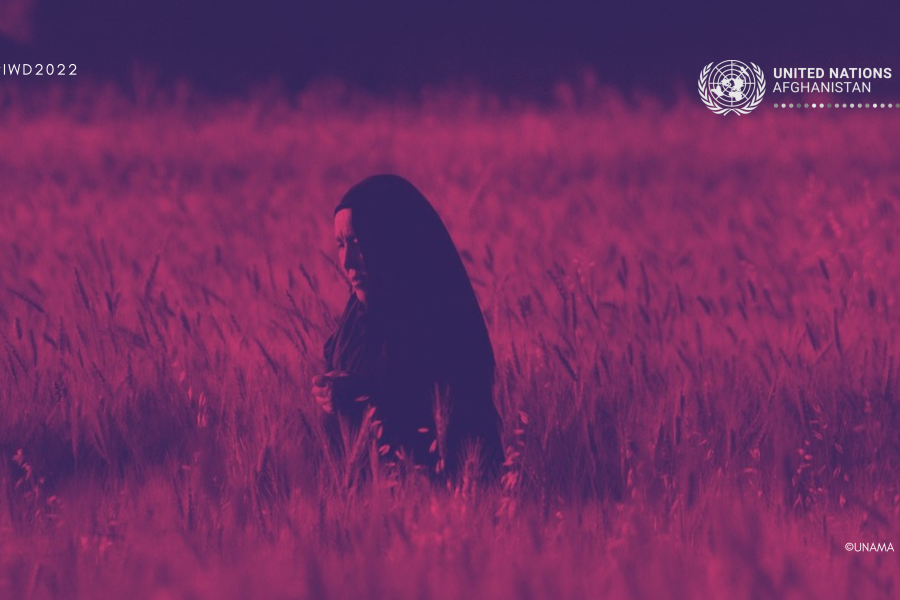Meet the Afghan women and girls who inspire and motivate us to work every day
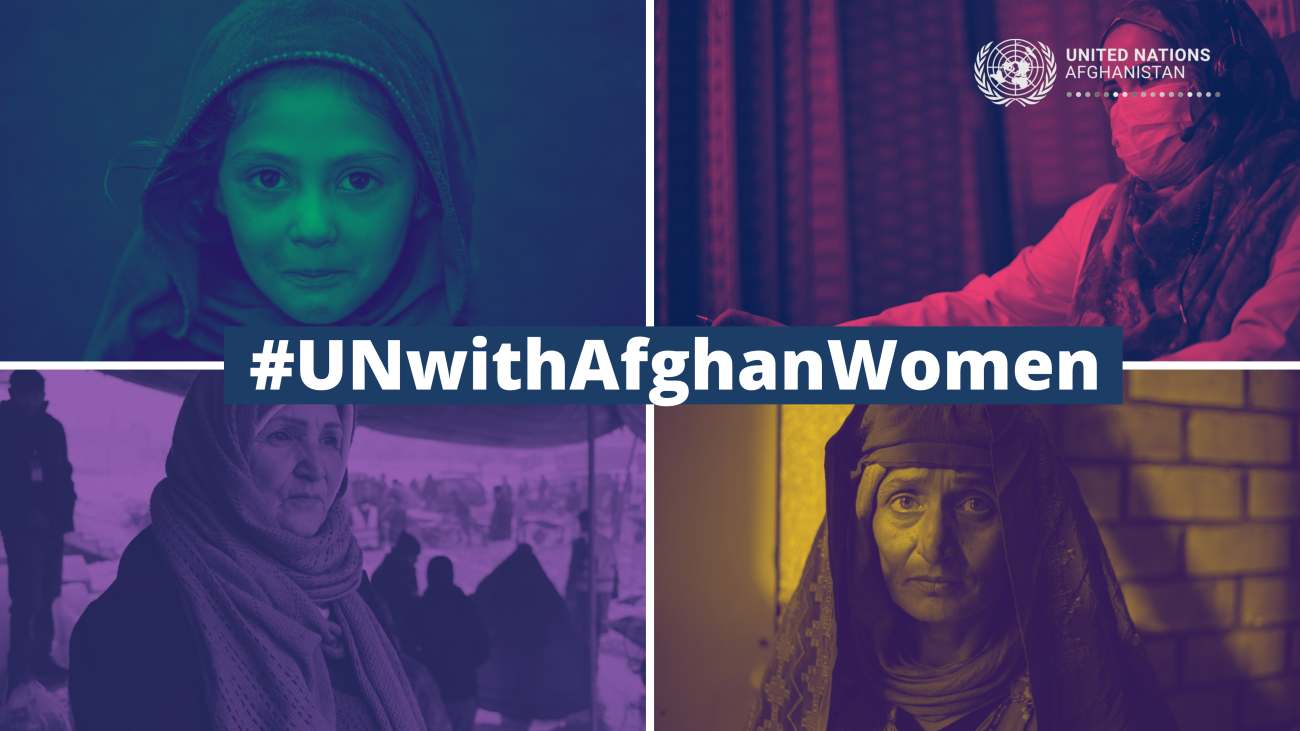
International Women’s Day 2022
“I used to be a university teacher, now I am unemployed,” explains Shukriya, an active member of her community until August 2021 who now finds herself standing in line for food distributed by the World Food Programme. Restrictions on women’s rights, such as the right to work, push many women like Shukriya to line up for food for the first time in their lives, reflecting the shifting face of hunger in Afghanistan.
No one should have to queue for food, but when but when this is necessary, the United Nations is there to ensure that people have what they need to pull themselves out of poverty and into a better life. On International Women’s Day and every day, the United Nations in Afghanistan stands with women like Shukriya to ensure that they have what they need to live a life of their choosing.
Some 35% of teachers in Afghanistan are women. Currently they are being paid only occasionally – or, as in Shukriya’s case, not paid at all. No durable peace, recovery, or stability is possible without women’s active engagement and participation in their country.
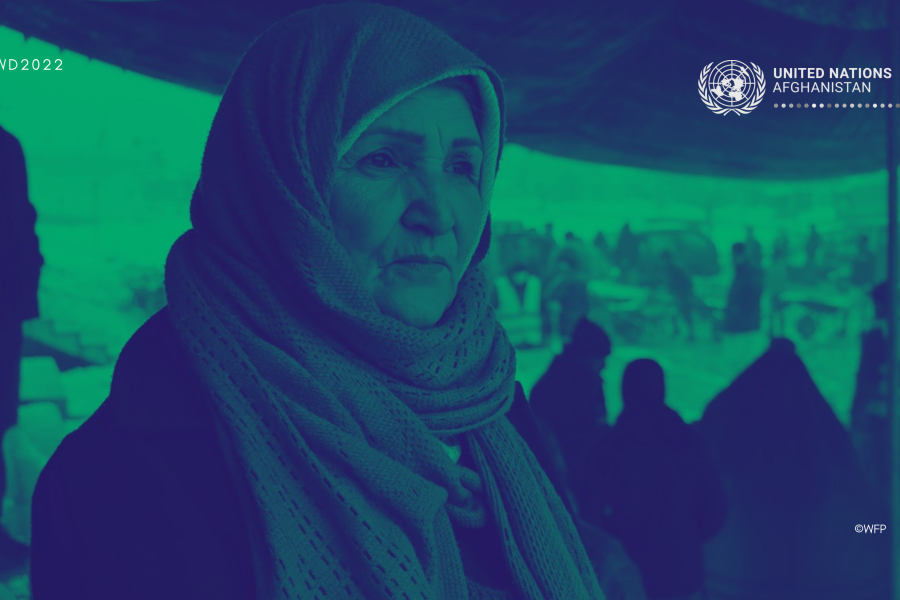
Dr. Razia is the only woman doctor in the COVID-19 ward of a hospital in Kabul – one of the four COVID-19 hospitals supported by the World Health Organization, with assistance from the European Union.
“During the fourth wave of the pandemic, we are seeing increasing number of patients coming to the hospital and the majority of them have comorbidities. As health workers, we continue to look after them even though we operate in extremely difficult circumstances. My role is to save lives and I will continue to serve my people,” says Dr. Razia
Women health workers serve many roles in the health system – doctors, nurses, midwives, pharmacists, laboratory experts, epidemiologists, cleaners, interns. On International Women’s Day and every day, the United Nations in Afghanistan stands with women like Dr. Razia to ensure that they have what they need to live a life of their choosing.
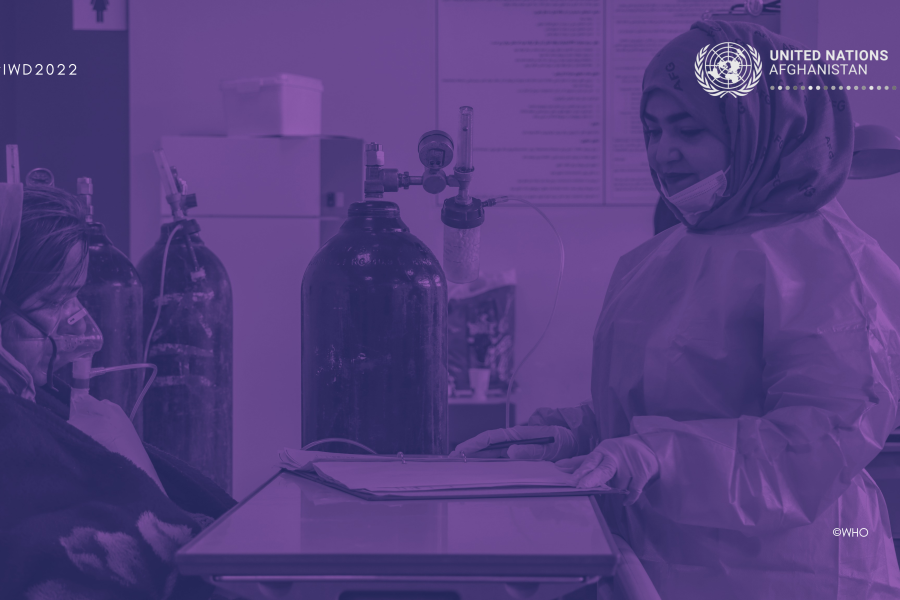
Shamsia, like millions of Afghans, was pushed out of her home by increased levels of insecurity in her town. Along with her parents and sisters, Shamsia now lives in a camp where people like her, who fled their homes in search of refuge within the country, do all they can to build a new life. For Shamsia, the journey from her home started when she was 12 and her parents could no longer afford her education.
Shamsia’s family initially moved to Kabul to pursue better economic opportunities. Now, they live in a camp in Mazar-i-Sharif, where Shamsia learnt how to weave carpets at a training run by the United Nations International Labour Organization. At 27, Shamsia is the sole breadwinner of her family and the head of a business that continues an ancient Afghan tradition.
No one should have to leave their home and choosing to do so is always a hard choice. The United Nations is there to ensure that people have what they need to start their lives anew.
3.5 million Afghans have fled their homes in search of refuge in other parts of the country. On International Women’s Day, as on every day, the United Nations in Afghanistan stands with women like Shamsia to ensure that they have what they need to live a life of their choosing.
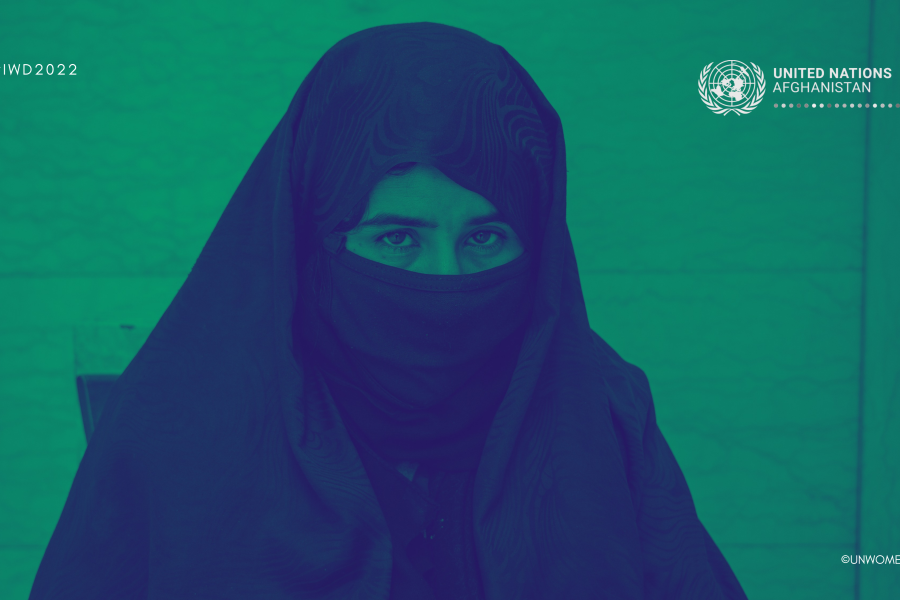
Amina noticed there was something different about Firoza’s delivery – another baby was on the way. Family Health House guidelines advise midwives like Amina not to attempt to deliver twins alone, but Firoza’s precarious condition meant it would have been too dangerous to transfer her to another facility, and in any case, most had closed due to the deteriorating security situation. Fearing for the well-being of her patient, Amina quickly called the Midwifery Helpline for support.
The Midwifery Helpline from the United Nations Population Fund offers remote mentoring to midwives in Afghanistan, 24 hours a day, 7 days a week. Launched in 2016, the toll-free number is staffed by two gynecologists and two midwives who provide counselling, referrals, and step-by-step instructions to lead health practitioners through complex, and at times lifesaving, procedures.
On International Women’s Day, as on every day, the United Nations in Afghanistan stands with women like Amina to ensure that they have what they need to live a life of their choosing.
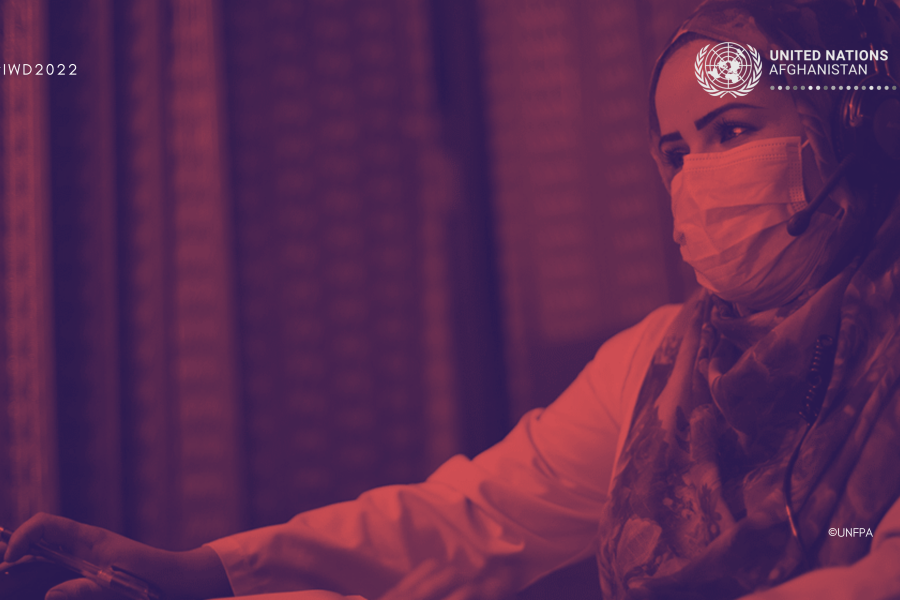
“I love drawing, but my parents cannot afford to buy me any paper or paint,” said Mariam, 16, who lives in Herat province. “Because I can’t go to school now, I just stay at home.” The Spotlight Initiative (SI) in Afghanistan, among other activities, creates safe spaces where girls and women like Mariam can access psychosocial support, learning, and other services during time of insecurity and crisis.
Mariam uses the safe spaces facilitated by the SI and its partners to paint, hoping that one day she will be able to complete her education and become a painter. Mariam’s father is now encouraging other members of his communities to send their girls to these dedicated safe spaces.
For over seven months, teenage girls across Afghanistan have been forbidden from attending school. On International Women’s Day and every day, the United Nations in Afghanistan stands with teenage girls like Mariam to ensure that they have what they need to live a life of their choosing.
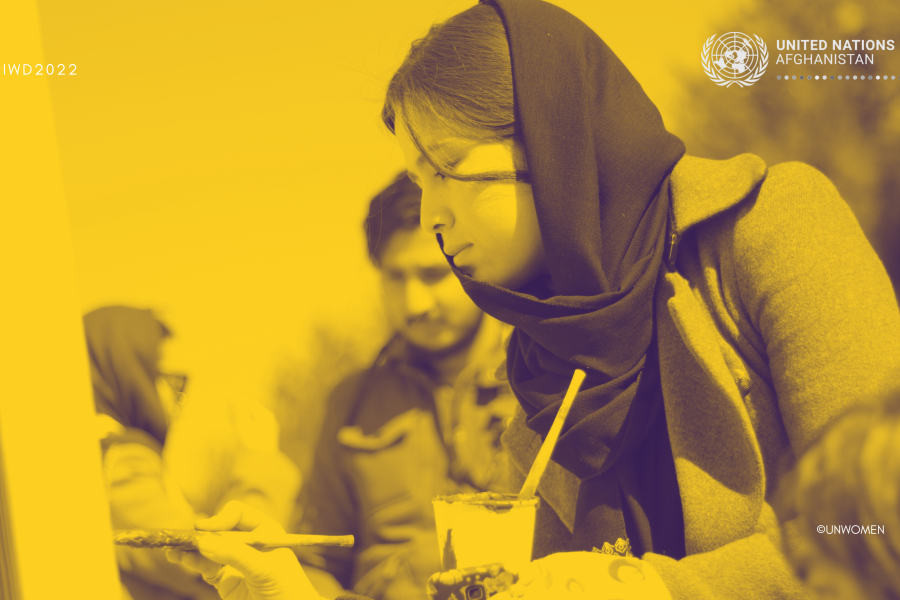
Hamida had worked in Afghanistan as a prosecutor, independent investigator, and civil society leader for more than 16 years. Like many across the country, the women’s protection shelter Hamida used to run is now closed. This shelter, run in partnership with the United Nations Entity for Gender Equality and the Empowerment of Women, hosted women and their children who would otherwise have remained trapped with the perpetrator of the abuse from which they fled. At these shelters, women learn how to read and write and acquire new skills that allow them to become economically independent. They also receive counselling to overcome trauma and interact with each other, sharing their stories in a healing way.
Today, Hamida is still in Afghanistan, advocating for the rights of Afghan women and girls. She is in daily contact with the women who used to come to her shelter. She offers counselling over the telephone, but she knows that this is not enough for those women who are locked in with their abusers.
It is estimated that 9 out of 10 Afghan women will experience some form of domestic violence during their lifetime. The United Nations in Afghanistan is advocating alongside women like Hamida for the reopening of life-saving services like women’s protection centres across the country.
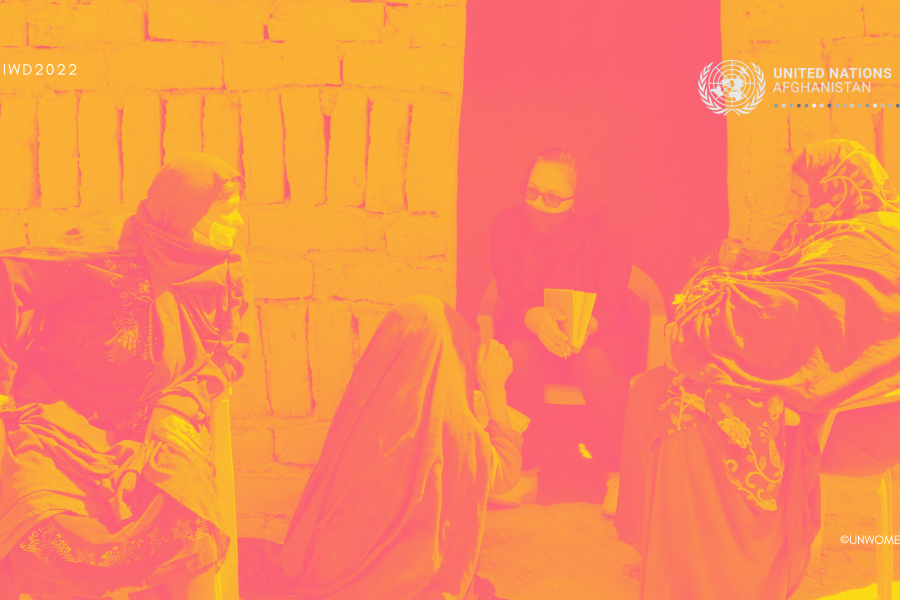
“I want to be a pilot one day,” notes Fazila – like many of her women colleagues works at the United Nations Humanitarian Air Service (UNHAS) managed by the World Food Programme. UNHAS flies where and when no one else can, delivering life-saving items like food, and transporting humanitarian experts where they are most needed.
In Afghanistan, UNHAS employs a team of women who are continuing to come to the workplace and provide an essential contribution to their country, despite the hurdles that many women like them now face in Afghanistan – restrictions on their rights to work, to learn, to move. When extreme crisis hits – like the one Afghanistan is currently facing, the United Nations continues to provide safe transport options for aid workers and life-saving assistance to the most hard-to-reach areas.
Some 24.4 million people need humanitarian assistance now in Afghanistan, half of them women or girls. On International Women’s Day, as on every day, the United Nations in Afghanistan stands with women like Fazila to ensure that they have what they need to live a life of their choosing.
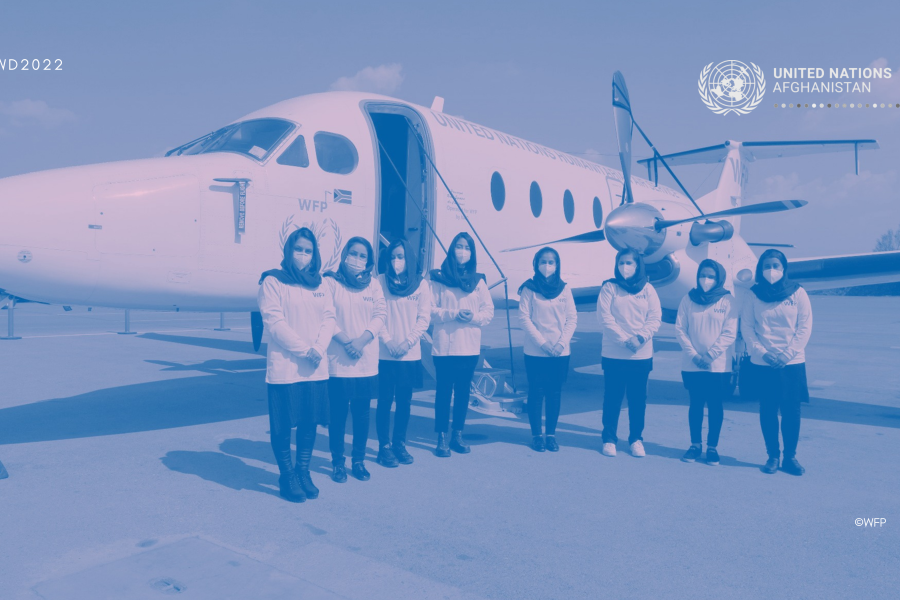
Twenty-two years ago, Hamida left Afghanistan in search of better opportunities for her and her family. War had forced her to leave everything behind and migrate to Iran. Hamida worked on a farm and, 16 years after leaving her home, came back to Afghanistan with the vision of running her own farm. Home was where Hamida and her family felt most comfortable – but her native province was still not safe and the economic situation across the country remained dire.
Hamida and her family moved to Mazar-i-Sharif, to a camp for internally displaced persons – people who had to flee their homes but did not cross an international border. Here, her farming skills were improved by the United Nations International Labour Organization, which matched her knowledge with management and financial skills. Now, Hamida is running a small-scale farm.
Although 80 per cent of the world’s food is produced by small-scale farming, the contribution of women farmers is often not maximized. As a farmer running her own farm, Hamida is feeding her family and contributing to her country’s economy. The United Nations in Afghanistan works with women and men to break down the barriers that prevent them from feeding their families, while promoting reinvestment in their livelihood.
Afghans make up one of the largest refugee populations worldwide. There are 2.6 million registered Afghan refugees worldwide, of whom 2.2 million are registered in Iran and Pakistan alone. On International Women’s Day – and every day – the United Nations in Afghanistan stands with women like Hamida to ensure that they have what they need to live a life of their choosing.
